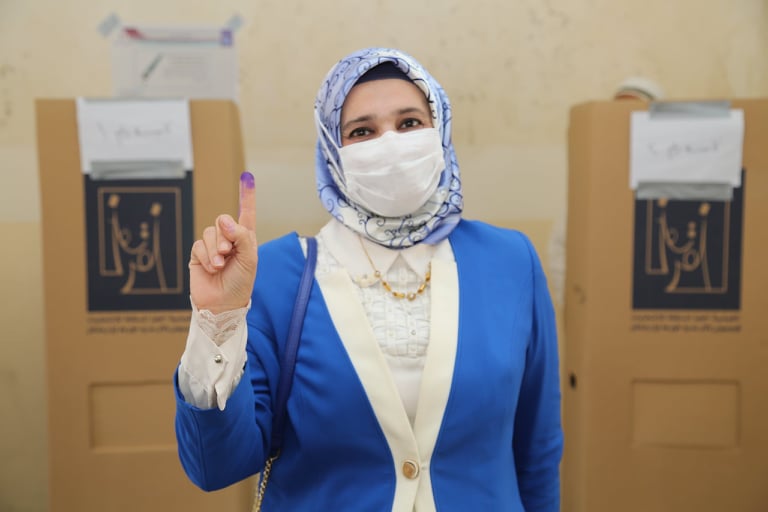Preliminary results show the Kurdish political parties have won six seats alike 2018 general elections while the Arab political parties have mounted their seats from three to four yet the Turkmens lost a seat and earned only two, a credible source told KirkukNow.
Totally 41% of the 24 million eligible Iraqi voters cast ballot in Iraq's early general elections to vote for 3,226 candidates vying for 320 parliamentary seats plus nine seats for the religious minorities, Independent High Electoral Commission IHEC said.
The low turnout is a signal of widespread distrust of the country’s leaders and the vote for a new parliament.
The chief Iraq election observer of the European Union, Viola von Cramon, said the relatively low turnout was significant.
Only 440,000 Kirkukis, about 44%, of more than one million people eligible to vote, cast ballots for 12 seats in the Iraqi parliament, three of it for women plus a seat for the Christian community.
Out of 130 competitors, only 33 of them were women. Kirkuk has been divided into the three electoral districts and 315 ballot stations.
The oil-rich, multi-ethnic province of Kirkuk, home to 1.6 million, is one of the main disputed areas in addition to Diyalah and Nineveh that a three-stage process outlined in Article 140 of the Iraqi constitution in 2005, stipulating normalization, a population census and a referendum on the status of the territories, was drawn to put an end to Kurdistan region government KRG and Iraqi Federal government dispute over these areas.
First constituency
The candidate of Kurdistan Democratic Party KDP led by Masoud Barzani, Shakhawan Abdullah has got 31,548 votes followed by Omed Mohammed of the New Generation 19,489.
The Patriotic Union of Kurdistan PUK which went into a coalition with Gorran (Change Movement) has won two seats for Dilan Ghafour and Sabah Habib. Muhaimin Hamdani, an independent Arab Candidate, has managed to earn a seat in the Kurdish-predominant constituency by earning 12,407 votes.
Kirkuk has been divided into three constituencies where the Kurdish inhabited neighborhoods are within the first electoral district and have five seats while the second mix electoral district is mainly home for the Turkmens who were willing to win the four seats while the PUK has two candidates, Ashti Mahdi and Gaylan Qadir of PUK, and the KDP only one candidate, Najwa Kaka'i.
The Arab parties had 21 candidates in the second mixed electoral district though their chances were not high.
The Arab-dominant third electoral district has three seats where the Kurdish political parties and alliances had no candidate.
Second Constituency
Out of four seats, Arashad Salihi, candidate of Iraqi Turkmen Front ITF has won the first seat for 19,585 followed by PUK’s Gaylan Qadir. The KDP has managed to get the third seat for Najwa Kaka’i. ITF got the fourth seat of women quota for Sawan Abdul-Qadir for 6,542 votes.
Back in 2018, the elections saw just 44% of eligible voters casting ballots, a record low. The results were widely contested.
Out of 12 parliamentary seats for Kirkuk province, PUK won six seats in Kirkuk province 2018 elections, three seats for each Arab and Turkmen communities and one quota seat for the Christians. The KDP boycotted 2018 elections in Kirkuk.
Third Constituency
The Arab candidates have earned all the three seats of Kirkuk’s third electoral district. Mohammed Tamim, candidate of Taqadum a list led by Iraqi speaker Mohammed al-Halbousi came in the first place for 21,047 followed by current acting governor of Kirkuk Rakan al-Jibouri, candidate of Arab Alliance who earned 12,890 votes and Wasfi Assi of the Arab Front was ranked the third.
Overall, the Kurds have won six seats, Arabs four and the Turkmens only two.





